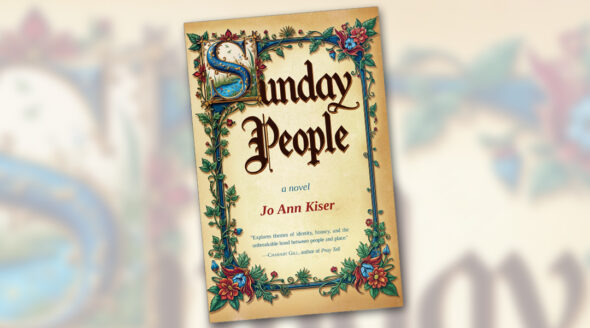
Review | Kiser’s resonant ‘Sunday People’
- Published: April 27, 2025
By Jane Blakelock
She’s back, and that’s great news for author Jo Ann Kiser’s fans and new readers. In “Sunday People” — her second novel and third book in less than four years — Kiser marries the pleasures of her short stories and longer narratives. As in her 2022 story collection, “The Guitar Player and Other Songs of Exile,” story arcs are independent. And as in 2023’s “A Young Woman from the Provinces,” Kiser illustrates more fully, more clearly, cultures of Eastern Kentucky and its environs. This time, a new cast of Osierville residents gather for a wedding uniting the niece and nephew of respective aunts with a conflicted past.
The event launches seven eponymous chapters whose accounts’ whole surpasses their simpler sum. Stories interpolate as readers recall prior retellings. The wedding takes place in a church that is a reincarnation of a reincarnation of an old time, rough-hewn Baptist structure. Kiser interrogates religious beliefs here, just as she does in her other books. Intent and charitable spirit are given the nod, with orthodoxy coincidental.
On Sarvis Mountain, as everywhere, stories tightly bound together remain each teller’s own. Eastern Kentucky’s parochial and progressive characters honor and defy stereotype, living interesting, human lives.
For Orson Caskill, a local merchant whose philosophies sharpen as his health wanes, religion is his favorite secluded pond, part of a legacy he wishes to entrust to the right person, while securing a couple last wishes. Then there is his friendship with Fergus, an otherwise friendless (with good reason) friend. Unfortunately, Fergus’s attachment to Orson carries with it a regrettable taint. Both aggravating and tender, Orson has clear insights about his family and himself. His favorite psalm ends, “I have loved the snare.”
Darcy, another complicated character, has a mostly gratifying and meaningful relationship with Orson’s granddaughter Melissa. Fleeting gestures belie Darcy’s conflicted emotions toward Orson, marked by his wife, Sarah Beth. Darcy works hard to want and appreciate what she has become, which is considerable, but gladly visits from Chicago to share in her sister’s Sarvis Mountain life. She is an insider and an outsider at the same time. Her hidden past includes one clear involvement that puts beyond all doubt that Darcy, too, loves — or at least has loved — the snare, and is partly caught in it for life.
Fergus loves the snare most of all, and in the eyes of many readers will remain irredeemable. His suffering at the hands of family yanks hard on Orson’s compassionate decency and imprints him as an instant savior to Fergus. He gives Orson plausible deniability of the worst of his crimes and dark personal offenses, but the reader has no such cover.
Sarah Beth’s long-standing family history includes respected clergy and Union and Revolutionary war heroes; she exerts a Ruth-like reverence for husband Orson’s and others’ histories. Archiving her family’s well-established accomplishments, she has made the colloquial a bible whose realms she rarely transgresses yet draws from broadly and effectively. Her manifold wisdom ensnares Orson’s lifelong affection; in turn, his needs and legacy circumscribe her life’s goals.
That Orson’s daughter Charlene’s affliction includes hearing voices fits with her essential talent for listening. She interprets exchanges with her spouse, Bob, without sentimentality. She attends to her two sons, who view her quite differently, perceptively. Charlene overhears parental disagreements and shares keenly inflected, longer dialogue among friends. She cannot herself choose the paths taken by her stalwart mother and her sibling, the “perfect” Tessie. Charlene does not wish to disentangle from her growth beyond the familiar past.
Jeff Caskill has his guitar, his work in his father’s store, and his insular love of an insulated life, but he is powerless to hem in his wife and daughter. Jeff works out his own legacy, his own sculpting of a life where he sacrifices his comfort zone, but never his general compass of allegiances. He gently notes that his wife, Bernice, has taught him “all [he knows] of Renoir.” Indeed, it is again, winsomely, women who seek out “book learning” and herald the love of art and culture, navigating and bringing a wider world back to the mountain.
In the final chapter, Melissa Caskill journals about Adam and Eve’s “seed of nostalgia when God cast them out of the garden,” and in time endures her own casting out. She is the next generation, and we watch her mature. She’s a little bit rock and roll in her new synthesis of all of it, from her father Jeff’s “magic circle” of Eastern Kentucky, to pain that shatters promising young lives, to finding persistent beauty and truth among a family’s shared realities. Melissa Caskill’s journey resonates as readers recognize how crucially the past exerts enduring influence on the future.
The Yellow Springs News encourages respectful discussion of this article.
You must login to post a comment.
Don't have a login? Register for a free YSNews.com account.












No comments yet for this article.